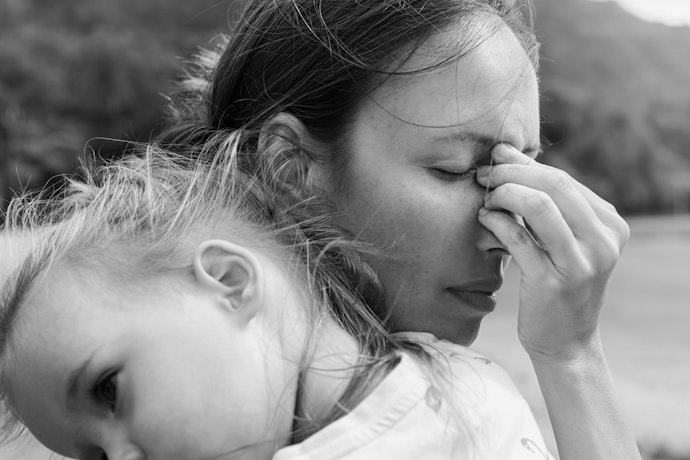I sat in bed barely able to look up at my husband. I was doing that ugly cry where your face can’t help but reveal your emotion.
I’ve always been transparent with my heart, yet opaque with my self-love.
And perhaps that’s because my self-compassion is often in short supply.
Any mis-step, mis-take, miss-the-mark, always seems to validate any truths I have about myself, the narrative that runs on replay most days, the one that says, “You aren’t enough.”
I have never called my enoughness into question more than becoming a mother.
And there, in the middle of my bed, with the covers pulled high, I sat like my child-self used to, replaying affirmations that fed into my negative self-talk.
I was never a mother who dreamed of being a mother. I was terrified at the thought of raising small humans, losing myself, and also, maybe even most of all, of finding myself.
Now, here I was sitting where so many others have sat before me (and likely many are as I write this): living in my not-enoughness.
I have been short-tempered.
Detached.
Distracted.
The words slipped past my lips, and there was no going back. “I feel like I am a terrible mother. Like I am failing them.” My heartfelt angst. I actually believed what I was saying.
And then my husband did something unexpected. He kneeled beside me, and instead of trying to fix it or make it better, he just listened. He let me cry. He let me express my pain. He never left me.
As my tears transitioned to sniffles, I thanked my husband for his support, honestly surprised by his course of action. Emotions and communication are not always his cup of tea.
Seeing the grateful yet curious look in my eyes, he smiled and replied, “I learned from you. This is what you do for our sons every day. Maybe you can’t see it because you’re so in it, but I see it. I see your worth. You are not a perfect parent AND you are the exact mom they need. Perfect is a myth, anyway.”
I realized the part I was lacking most wasn’t my mothering skills. It was my self-love, self-compassion, and self-respect that needed polishing.
I see a little girl in my reflection, the one who felt she had to carry the burden of perfection, who felt she was only worthy if she was performing at 100% at all times, and I tell her what I needed to hear all those years ago: You are worthy of giving love and being loved.
Many people say that you can’t love another until you fully love all parts of yourself. I actually believe this to be false. Motherhood has taught quite the opposite.
But I do believe it is challenging to let others love you and to receive that love in its full capacity if you do not love yourself.
Somewhere along the way I learned to self-abandon who I was in order to feel loved, safe, and bonded to my parents. When we learn at a young age that our parents' love isn't reliable, we become hypervigilant to their moods and rescue them by becoming whoever they need us to be. This becomes our survival mechanism - our way to control how other people see us, and it jades the way we see ourselves. Our worth becomes less about our innate goodness and more about external measures of performance and other people's satisfaction.
Our kids are without conditions. They love with open hearts and see past our mistakes, our shortcomings, and our false narratives. They see us for who we truly are - all parts - and they choose to love us anyway. From their grace, we learn to heal and love ourselves, too.
Reparent Yourself
Intergenerational healing is about progress... not perfection.
By understanding and embracing your inner child with kindness, you become resilient, improve your emotional well-being, and form a deeper connection with yourself and others.
If you would like guidance and support in your reparenting journey, please take a moment to explore the Reparent Yourself Masterclass Bundle.
Lifetime Access to 20 Interactive Courses, Guided Meditations, Healing Movement, and Other Transformative Resources. The Reparent Yourself Masterclass Bundle is available at 94% Off Savings for a limited time.















